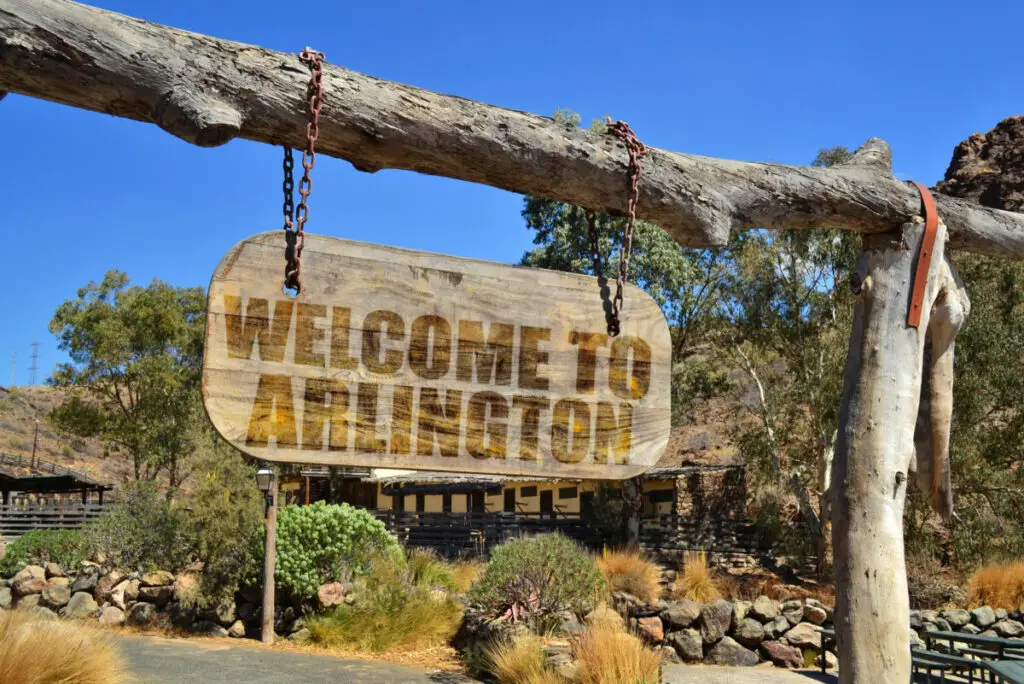
Arlington, Texas is a central hub of the Dallas-Fort Worth (DFW) area. With a large sports scene and decent weather year-round, some may love living here.
However, Arlington isn’t going to be an ideal home for everyone. Read on and see what makes Arlington a less-than-desirable place to live.
1. Limited Public Transportation
For being such a large, populated city with plenty of tourist activity, public transportation in Arlington is basically nonexistent. Amtrack, a country-wide transit system, runs through Arlington but doesn’t stop in the city. This simply isn’t enough to serve those who need other options to get around town.
Limited public transportation means that it is harder for people to get outside of their neighborhoods. This may have an impact on local businesses, nightlife, and participation in other extracurriculars that can be found around the city. Especially in Arlington, which has a large sports scene, theme parks, and central access to Dallas and Fort Worth, the lack of public transit is a tragedy for anyone who doesn’t have easy access to a car.
2. Limited Walkability

The combination of no public transportation and low walkability is one that doesn’t make for an ideal place to live. Arlington has a low walk score of 38, meaning that the majority of errands must be accomplished by car.
of 38, meaning that the majority of errands must be accomplished by car.
Driving isn’t ideal for many reasons, one being that more time spent driving means less time is spent out walking and connecting with the community and nature. Generally, in car-dependent cities, those who drive must spend more time in their cars getting to and from places rather than having time to explore aspects of the city around them.
Walkable cities also promote better health. Not only are residents able to get more physical activity throughout their day, but pollution is also lower in cities that don’t rely on cars. Cities that are walkable also allow people to make transportation choices based on preference rather than need. Citizens can choose to walk or bike around for daily needs and can use a car if needed for further travel. Unfortunately, residents of Arlington don’t have these options.
3. Traffic Congestion
Yet another issue that comes with car-dependent travel is traffic congestion. Several residents of Arlington have mentioned that traffic is frequently difficult to navigate. Traffic leads to longer commutes, more air pollution, and frequent construction. Referring to the traffic, one resident stated that Arlington is “like a completely different city” during rush hour.
that traffic is frequently difficult to navigate. Traffic leads to longer commutes, more air pollution, and frequent construction. Referring to the traffic, one resident stated that Arlington is “like a completely different city” during rush hour.
Some residents have also referenced the unfriendly drivers that are on the road during high-traffic hours. Not only can traffic be annoying, but reckless, speeding drivers raise the risk of accidents on the road.
4. Heat

Arlington is hot all year round, and it’s not nearly as much of an exaggeration as one might think it is. Yearly temperatures range from the high 50s to the high 90s, with any cooler temperatures only lasting for a few months.
Consistent heat brings several unfavorable factors. The constant heat is almost unbearable, especially for anyone lacking a quality air conditioning system. Heat can somewhat be buffered by the presence of green space throughout a community. While Arlington has several parks, there is still the issue of getting to one. If people don’t have the necessary means of getting to a park, enjoying the outdoors becomes more difficult.
5. Humid
Yet another unfortunate aspect of Arlington’s weather is how humid it is. This city only sees an average of 77 days of rain per year, with approximately 30 more days of sun than the national average. Despite the lack of precipitation, this city is still quite humid throughout the year, hovering around 60%-70%
an average of 77 days of rain per year, with approximately 30 more days of sun than the national average. Despite the lack of precipitation, this city is still quite humid throughout the year, hovering around 60%-70% humidity constantly.
humidity constantly.
Depending on one’s climate preferences, humidity isn’t always fun to deal with. Especially during the summer months, this weather can become sticky and muggy.
Additionally, humidity is just annoying. It causes more sweat that doesn’t evaporate quickly in the humidity, and for anyone with long, curly, or thick hair, frizz becomes a nuisance.
6. Boring Food Options

When it comes to quality local restaurants, Arlington is lacking. If you’re looking for high-end places to try, Arlington doesn’t have much. However, if you’re big into sports food, then, by all means, settle in! Arlington has a lot of southern food, but there aren’t a lot of other decent options.
7. High Crime Rate
Crime rates are higher in Arlington than in other parts of Texas for both property crime and violent crime. To give a better indication of the numbers, the median number for Arlington is 126 crimes committed per square mile, while the median number of crimes committed per square mile in Texas is 27, and the national median is 26.9. The high amount of crime in Arlington is a concern for many residents.
than in other parts of Texas for both property crime and violent crime. To give a better indication of the numbers, the median number for Arlington is 126 crimes committed per square mile, while the median number of crimes committed per square mile in Texas is 27, and the national median is 26.9. The high amount of crime in Arlington is a concern for many residents.
Crime tends to not have an equal distribution across cities, and some neighborhoods see higher crime rates than others. In Arlington, reported crime is highest in the center of the city, and the numbers go down around the edges of town.
of the city, and the numbers go down around the edges of town.
8. Coyotes and Foxes
Much of North Texas experiences the presence of coyotes, bobcats, and foxes, and Arlington is no different . The sly predators don’t always keep to the outskirts of cities, and they can be found in yards and alleyways, looking for their next meal.
. The sly predators don’t always keep to the outskirts of cities, and they can be found in yards and alleyways, looking for their next meal.
Not only is it uncomfortable to run into these animals, but they are also a nuisance for locals, small wildlife, and pets. Coyotes specifically can be found rummaging through trash or any accessible pet food. Additionally, these animals may be on the lookout for roadkill, small pets, and wildlife like mice, birds, and squirrels.
9. Snakes

Another unfavorable aspect of DFW wildlife is the presence of snakes . Many of the snakes found around this area of Texas aren’t actually that venomous, but that doesn’t mean that they’re friendly critters to run into. Plus, just because a snake isn’t venomous, that doesn’t mean it won’t try to bite someone if threatened.
. Many of the snakes found around this area of Texas aren’t actually that venomous, but that doesn’t mean that they’re friendly critters to run into. Plus, just because a snake isn’t venomous, that doesn’t mean it won’t try to bite someone if threatened.
10. Popular Sports Hub
Arlington draws sports fans from all around the DFW area. This city is home to two of the most popular teams in Texas; the Texas Rangers and the Dallas Cowboys. Additionally, other smaller sports centers dot the area. With the traffic issues already present from being a car-dependent neighborhood, traffic becomes especially terrible to navigate during sports seasons. It interrupts local travel and brings in plenty of other bad drivers who aren’t friendly and don’t know where they are going.
11. Lack of NightLife
A city that comes alive at night brings opportunities to make friends, and discover local food, music, and art. Some people feel that Arlington doesn’t meet the quality aspects of nightlife that make after-work hours enjoyable.
feel that Arlington doesn’t meet the quality aspects of nightlife that make after-work hours enjoyable.
Much of the available nightlife is located in downtown Arlington. Having to travel to downtown Arlington, especially late at night, may be inconvenient for those out around the edges of the city or anyone who would need public transit to get to the downtown area.
One resident pointed out that much of the nightlife involves drinking, which isn’t everyone’s cup of tea. For those who prefer a greater variety of nightlife, from music to theater or an evening café, Arlington might not be the best place to move to.
pointed out that much of the nightlife involves drinking, which isn’t everyone’s cup of tea. For those who prefer a greater variety of nightlife, from music to theater or an evening café, Arlington might not be the best place to move to.
12. Low Household Income
Low household income is defined as any five-person household making between $30,170 to $60,340. The average income for Arlington isn’t much higher than the cut-off for low-income, as the median income
as any five-person household making between $30,170 to $60,340. The average income for Arlington isn’t much higher than the cut-off for low-income, as the median income for this city is $63,351.
for this city is $63,351.
Low income also affects the cost of living in a negative way. When looking for housing, especially as costs rise, it may be difficult to find a preferable living situation. On an overall scale, Arlington is a costly place to live compared with the rest of Texas. Groceries, healthcare, housing, transportation, and more, average out at higher costs than the average cost of living in Texas. When looking for a place to move, it’s best to match income with the cost of living in order to maintain a stable, less stressful day-to-day lifestyle.
a preferable living situation. On an overall scale, Arlington is a costly place to live compared with the rest of Texas. Groceries, healthcare, housing, transportation, and more, average out at higher costs than the average cost of living in Texas. When looking for a place to move, it’s best to match income with the cost of living in order to maintain a stable, less stressful day-to-day lifestyle.
13. Poverty Rate
Along with the low cost of living, Arlington also has a high rate of poverty. Across the city, over 14% of people live in poverty. This means, for families specifically, that those who aren’t making above the threshold for household income (which here in Arlington is $30,000) are considered to be living below the poverty line. For individuals, those who make less than $12,880 per year are considered to be below the poverty line.
Back in 2018 , this city made an announcement addressing the issue, with the introduction of the “Bridges Out of Poverty” initiative, which was meant to address barriers to better options for those in poverty and work towards change and opportunity. Recent reports
, this city made an announcement addressing the issue, with the introduction of the “Bridges Out of Poverty” initiative, which was meant to address barriers to better options for those in poverty and work towards change and opportunity. Recent reports suggest that this plan must still be worked on in order to provide necessary relief to those in poverty.
suggest that this plan must still be worked on in order to provide necessary relief to those in poverty.
14. Transit City

One issue about the city of Arlington is its location. Siting between Dallas and Fort Worth, Arlington is, unfortunately, the little brother of the area. This means that people who live in Arlington will likely commute out of the city every day for work adding to the traffic. In addition, people will likely travel through the city instead of traveling to it, filling the roads with cars but not bringing people or money to the city.
Even worse, if there is a sports game you can bet the city will be overflowing with outsiders overwhelming everyone who lives in Arlington. If you don’t want to live in a stepping-stone city, do not move to Arlington.
15. Poor Roads
We have already talked about the traffic on the roads running through Arlington. What we have not talked about is some of the issues with the roads themselves. The roads in Arlington tend to be underdeveloped and are not made for the amount of traffic they carry each day. This is part of the reason there is so much congestion in Arlington.
Something else that doesn’t help is how the roads are designed. Since there isn’t much public transportation in Arlington, the city has tried a couple of different things to reduce traffic. One of these things was adding bike lanes to many of the roads in the hopes of encouraging people to bike. Instead, these bike lanes reduce the amount of road available for cars to use for a handful of bikers. If you don’t want to be caught in traffic on a narrow street, don’t move to Arlington.
16. Expenses
When living in a city, you need to consider how much it is going to cost you to live there. Generally, you live outside of a city if you want to live relatively cheaply, but this means you have less access to destinations within a city, or you can pay a bit more to live in a city and reap the benefits.
In Arlington, you get the worst of both worlds. Since Arlington is a larger city, you get the pollution, traffic, and congestion of a large city. However, you don’t get the destinations or the spirit of a city like Los Angeles or New York in Arlington. You will pay more for housing, pay for gas to sit in traffic, and pay for the privilege of living in Arlington. If this isn’t appealing to you, you may want to look for another city to move to.
17. Lack of Identity
A final reason that you might not want to move to Arlington is its lack of identity as a city. When you think of large cities, there should always be something about the city that comes to your mind. For New York, it is large pizza slices and the Statue of Liberty. For Los Angeles it is Hollywood. Portland is, well, weird (Keep Portland Weird).
When we talk about Arlington, what comes to mind? You might think that I could be sports, but most of the fans come into the city, they don’t stay there. This leaves you telling people that you live in Arlington, Texas, and them staring blankly back at you and asking where that is.
